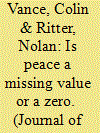|
|
|
Sort Order |
|
|
|
Items / Page
|
|
|
|
|
|
|
| Srl | Item |
| 1 |
ID:
097218


|
|
|
|
|
| Publication |
2010.
|
| Summary/Abstract |
The allure of an environmentally benign, abundant, and cost-effective energy source has led an increasing number of industrialized countries to back public financing of renewable energies. Germany's experience with renewable energy promotion is often cited as a model to be replicated elsewhere, being based on a combination of far-reaching energy and environmental laws that stretch back nearly two decades. This paper critically reviews the centerpiece of this effort, the Renewable Energy Sources Act (EEG), focusing on its costs and the associated implications for job creation and climate protection. We argue that German renewable energy policy, and in particular the adopted feed-in tariff scheme, has failed to harness the market incentives needed to ensure a viable and cost-effective introduction of renewable energies into the country's energy portfolio. To the contrary, the government's support mechanisms have in many respects subverted these incentives, resulting in massive expenditures that show little long-term promise for stimulating the economy, protecting the environment, or increasing energy security.
|
|
|
|
|
|
|
|
|
|
|
|
|
|
|
|
| 2 |
ID:
133710


|
|
|
|
|
| Summary/Abstract |
Sample selection models, variants of which are the Heckman and Heckit models, are increasingly used by political scientists to accommodate data in which censoring of the dependent variable raises concerns of sample selectivity bias. Beyond demonstrating several pitfalls in the calculation of marginal effects and associated levels of statistical significance derived from these models, we argue that many of the empirical questions addressed by political scientists would - for both substantive and statistical reasons - be more appropriately addressed using an alternative but closely related procedure referred to as the two-part model (2 PM). Aside from being simple to estimate, one key advantage of the 2 PM is its less onerous identification requirements. Specifically, the model does not require the specification of so-called exclusion restrictions, variables that are included in the selection equation of the Heckit model but omitted from the outcome equation. Moreover, we argue that the interpretation of the marginal effects from the 2 PM, which are in terms of actual outcomes, are more appropriate for the questions typically addressed by political scientists than the potential outcomes ascribed to the Heckit results. Drawing on data from the Correlates of War database, we present an empirical analysis of conflict intensity illustrating that the choice between the sample selection model and 2 PM can bear fundamentally on the conclusions drawn.
|
|
|
|
|
|
|
|
|
|
|
|
|
|
|
|
|
|
|
|
|